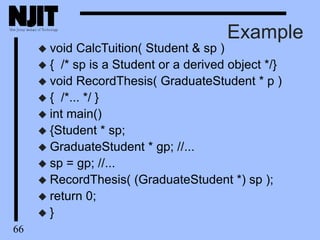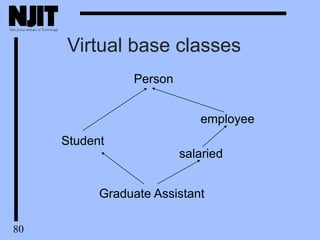Inheritance in C++.ppt
- 1. 1 Inheritance in C++ Lesson #6 Note: CIS 601 notes were originally developed by H. Zhu for NJIT DL Program. The notes were subsequently revised by M. Deek.
- 2. 2 Content Base and Derived Classes Single Inheritance Declaration of derived classes Order of Constructor and Destructor Execution Inherited member accessibility Multiple Inheritance Virtual Base Classes
- 3. 3 Base and Derived Classes A base class is a previously defined class that is used to define new classes A derived class inherits all the data and function members of a base class (in addition to its explicitly declared members.)
- 4. 4 Single Inheritance Implement an “is-a” relationship The derived class only has one base class.
- 5. 5 Example 1: Student • name • id • major Undergraduate • year • minor • etc. Graduate • advisor • thesis • research • etc...
- 6. 6 Example 2: Publication: • publisher • date Magazine: • # of issues per year • circulation Book: • ISBN • author
- 7. 7 Example: Publication #include “FString.h" class Publication { public: void SetPublisher( const FString & p ) {publisher.Assign(p);}; void SetDate( unsigned long dt ) {date = dt;}; FString GetPublisher(){return publisher;}; unsigned long GetDate(){return date;}; private: FString publisher; unsigned long date; };
- 8. 8 Publication class Magazine :public Publication { public: void SetIssuesPerYear( unsigned n ){issuesPerYear=n;}; void SetCirculation( unsigned long n ){ circulation=n;}; unsigned GetIssuesPerYear(){return issuesPerYear;}; unsigned long GetCirculation(){return circulation;}; private: unsigned issuesPerYear; unsigned long circulation; };
- 9. 9 Publication class Book :public Publication { public: void SetISBN( const FString & s ) {ISBN.Assign(s);}; void SetAuthor( const FString & s ) {author.Assign(s);}; FString GetISBN() {return ISBN;}; FString GetAuthor() {return author;}; private: FString ISBN; FString author; };
- 10. 10 Publication int main() {Book B; B.SetPublisher( "Prentice Hall" ); B.SetDate( 970101L ); B.SetISBN( "0-02-359852-2" ); B.SetAuthor( "Irvine, Kip" ); cout << B.GetPublisher()<<endl <<B.GetDate()<<endl <<B.GetISBN().CString()<<endl <<B.GetAuthor().CString()<<endl; Magazine M; M.SetIssuesPerYear( 12 ); M.SetCirculation( 500000L ); cout << M.GetIssuesPerYear()<<endl <<M.GetCirculation()<<endl; return 0; }//ex6pub(Fstring.h, fstring.cpp, ex6pub.cpp)
- 11. 11 Different Views of an Employee Full-time or part-time Permanent or Temporary How do you define its base class? How td you define derived classes based on this base class?
- 12. 12 Declaring Derived Classes Class class_name: access_specifieropt or base_class { Member_list } access_specifier ::= public|protected|private(default) Equivalent to : Subclass ::=<Id, SupeId, Ds, Ops, Intfc>
- 13. 13 3D Point class Point { public: Point(); Point( int xv, int yv ); void SetX( int xv ); void SetY( int yv ); private: int x; int y; };
- 14. 14 3D Point class Point3D :public Point { public: Point3D(); Point3D( int xv, int yv, int zv ); void SetZ( int zv ); private: int z; };
- 15. 15 3D Point int main() { Point3D P; P.SetX( 100 ); P.SetY( 200 ); P.SetZ( 300 ); return 0; } Point3D::Point3D( int xv, int yv, int zv ) { SetX( xv ); SetY( yv ); SetZ( zv ); }
- 16. 16 Order of Constructor and Destructor Execution Base class constructors are always executed first. Destructors are executed in exactly the reverse order of constructors The following example, shows you the ordering of constructors.
- 17. 17 Example Class Employee{ Public: Employee(); //… }; Class SalariedEmployee:public Employee{ Public: SalariedEmployee(); //… }; Class ManagementEmployee:public SalariedEmployee{ Public: ManagementEmployee(); //… }; ManagementEmployee M;
- 19. 19 Example #include <iostream.h> class Coordinate { public: Coordinate() { cout << "Coordinate,"; } ~Coordinate() { cout << “~Coordinate,"; } }; class Point { public: Point() { cout << "Point,"; } ~Point() { cout << “~Point,"; } private: Coordinate x; Coordinate y; };
- 20. 20 Example class Point3D :public Point { public: Point3D() { cout << "Point3D,"; } ~Point3D() { cout << “~Point3D,"; } private: Coordinate z; }; class Shape { public: Shape() { cout << "Shape,"; } ~Shape() { cout << “~Shape,"; } };
- 21. 21 Example class Sphere :public Shape { public: Sphere() { cout << "Sphere"; } ~Sphere() { cout << "Sphere"; } private: Point3D center; unsigned radius; }; int main() { Sphere S; return 0; } //See Ex6-1.cpp
- 22. 22
- 23. 23 Overriding A function in the derived class with the same function name will override the function’s variables in the base class. You can still retrieve the overridden functions variables by using the scope resolution operator ”::”.
- 24. 24 Overriding #include <iostream.h> #include <stdlib.h> class A { int i; public: A(){i = 5;}; int get(){return i;}; }; class B: public A { int i; public: B(){i = 10;}; int get(){return i;}; }; void main() { B b; int x; cout << b.get()<<endl; cout << b.A::get()<<endl; cout << sizeof(x)<<endl; cout << sizeof(b)<<endl; }//ex7overriding.cpp
- 25. 25 Types of Class Members private protected public
- 26. 26 not accessible Private Public Protected Accessible to derived classes only Derived Class Accessible to derived classes and the instances Types of Class Members ?
- 28. 28 Public Inheritance Public and protected members of the base class become respectively public and protected members of the derived class.
- 30. 30 Example #include <iostream.h> #include <assert.h> class Item { Item * ptr; int data; public: Item(){data = 0; ptr = NULL;}; Item(int i){data = i; ptr = NULL; cout <<"Item::Item"<<i <<endl; };
- 31. 31 Example void setItem(int i){data = i; cout <<"Item::setItem"<<i <<endl; }; void setPtr(Item * i){ptr = i; cout <<"Item::setPtr"<<endl; }; int getData(){return data;}; Item * getPtr(){return ptr;}; };
- 32. 32 Example class List { Item * head, *first, *last; public: List(){ head = NULL; first = head; last = head; } Item * RemoveLast(); Item * RemoveFirst(); void PutFirst( Item * I ); void PutLast( Item * I ); protected: int IsEmpty() const {return (head==NULL);}; };
- 33. 33 Example Item * List::RemoveFirst() { Item * temp; temp = first; first = first -> getPtr(); cout <<"List:: RemoveFirst()"<<endl; return temp; }; Item * List::RemoveLast() { Item * temp; temp = last; last = last -> getPtr(); cout <<"List:: RemoveLast()"<<endl; return temp; };
- 34. 34 Example void List::PutFirst(Item * I) { I->setPtr(first); first = I; cout <<"List::PutFirst"<<I->getData() <<endl; }; void List::PutLast(Item * I) { I->setPtr(last); first = I; };
- 35. 35 Example class Stack :public List { public: void Push( Item * I ); Item * Pop(); }; void Stack::Push( Item * I ) {PutFirst( I ); cout <<"Stack::Push"<<I->getData() <<endl; } Item * Stack::Pop() {cout <<"Stack::Pop()"<<endl; return RemoveFirst(); }
- 36. 36 Example int main() {Item anItem(50), *p; Stack aStack; aStack.Push( &anItem ); p = aStack.Pop(); cout <<"aStack.Pop"<< p->getData()<<endl<<endl; anItem.setItem(100); aStack.Push( &anItem ); p = aStack.RemoveFirst(); cout <<"aStack.RemoveFirst"<< p- >getData()<<endl<<endl; return 0; }//ex6-2.cpp
- 37. 37
- 38. 38
- 39. 39 Private Inheritance Public and protected members of the base class become private members of the derived class.
- 41. 41 Example class Queue :private List { public: void Enqueue( Item * I ); Item * Serve(); }; void Queue::Enqueue( Item * I ) { List::PutFirst( I ); cout <<"Queue::Enqueue"<<I->getData() <<endl; } Item * Queue::Serve() {cout <<"Queue::Serve"<<endl; return List::RemoveFirst(); }
- 42. 42 Example int main() {Item anItem(50), *p; Queue aQueue; anItem.setItem(60); aQueue.Enqueue(&anItem); p = aQueue.Serve(); cout <<"aQueue.Serve"<< p- >getData()<<endl<<endl; anItem.setItem(600); aQueue.Enqueue(&anItem); p =aQueue.RemoveFirst(); //Unaccessible //cout <<"aQueue.RemoveFirst"<< p- >getData()<<endl; return 0; }//ex6-3.cpp
- 43. 43
- 44. 44 Protected Inheritance Public and protected members of the base class become protected members of the derived class.
- 46. 46 Example class Stack1 :protected List { public: void Push( Item * I ); Item * Pop(); }; void Stack1::Push( Item * I ) {PutFirst( I ); cout <<"Stack1::Push"<<I->getData() <<endl; } Item * Stack1::Pop() {cout <<"Stack1::Pop()"<<endl; return RemoveFirst(); }
- 47. 47 Example int main() {Item anItem(50), *p; Stack1 aStack1; aStack1.Push( &anItem ); p = aStack1.Pop(); cout <<"aStack1.Pop"<< p->getData()<<endl<<endl; anItem.setItem(100); aStack1.Push( &anItem ); p = aStack1.RemoveFirst();//Unaccessible! cout <<"aStack1.RemoveFirst"<< p->getData() <<endl<<endl; return 0; }
- 48. 48
- 49. 49 The accessibility of inherited members in a derived class derived member Public Protected Private Public X X Protected X X Private
- 50. 50 The accessibility of inherited members for an instance Private Protected X Public Private Protected Public derived member
- 51. 51 Constructor- Initializers Point3D::Point3D(param-list): ctor- initializer {// function body } ctor-initializer is actually used to transfer the parameters to the constructors of the base-class
- 52. 52 Publication #include <iostream.h> #include <string.h> class Date { public: Date( int mo, int dy, int yr ) { month = mo; day = dy; year = yr; cout << "Date constructorn"; } // Ex6pub2.cpp
- 53. 53 Publication Date( Date & D ) { month = D.month; day = D.day; year = D.year; cout << "Date copy constructorn"; } ~Date() { cout << "Date destructorn"; } private: int year; int month; int day; };
- 54. 54 Publication class Publication { public: Publication( char * publshr, Date & aDate ) : pubDate( aDate ) { strcpy( publisher, publshr); cout << "Publication constructorn"; } ~Publication() { cout << "Publication destructorn"; } private: char publisher[30]; Date pubDate; };
- 55. 55 Publication class Magazine :public Publication {public: Magazine( char * publshr, Date & aDate, int issues ): Publication( publshr, aDate ) {issPYear = issues; cout << "Magazine constructorn"; } ~Magazine() { "Magazine destructorn"; } private: int issPYear; // issues per year }; int main() { Magazine aMag( "Zipp", Date(10, 1, 95), 12 ); return 0; }
- 56. 56
- 57. 57 Why use the constructor-initializer? Without it, the default constructor for the base class would be called, which would then have to be followed by calls to access functions to set specific data members. A constructor initailizer is therefore more efficient.
- 58. 58 Constructors in Derived Classes When an object of a derived class is created, the constructor of the object must first explicitly call the constructor of the base class. This is the same as constructor- initializer.
- 59. 59 Destructor Function Destructors are called implicitly starting with the last derived class and moving in the direction of the base class.
- 60. 60 Compatibility Between Base and Derived Classes An object of a derived class can be treated as an object of its base class. The reverse is not true.
- 61. 61 Nested Class Scope A public or protected base class member that is hidden from the derived class can be accessed using the scope resolution operator ” ::” For example: base-class::member The “that” of base class can not access the members of its derived classes.
- 62. 62 Example Class Parent { public: void Print() const; //… } class Child: public Parent { public: void Print() const{ Parent::print();// scope resolution !!! cout <<age<<‘n’ <<school<<‘n’; } private; int age; Fstring school; }
- 63. 63 Error Void Parent::Print() { cout<<name <<‘n’ <<Child::age <<‘n’; //base can not access that of derived }
- 64. 64 Implicit Conversion of Derived Pointers to Base Pointers A base type pointer can point to either a base object or a derived object. Point3D center;// Point3D is derived from Point Point * p = ¢er; Point3D *cp = new Point3D; Point *p; p = cp;
- 65. 65 Example class FString { }; class Student { public: //... private: long id; }; class GraduateStudent :public Student { public: //... private: FString thesisTitle; };
- 66. 66 Example void CalcTuition( Student & sp ) { /* sp is a Student or a derived object */} void RecordThesis( GraduateStudent * p ) { /*... */ } int main() {Student * sp; GraduateStudent * gp; //... sp = gp; //... RecordThesis( (GraduateStudent *) sp ); return 0; }
- 67. 67 Casting Base Pointers to Derived Pointers A base pointer can not be implicitly converted to a derived pointer. This conversion is risky, because the derived object can contain more than the base object.
- 68. 68 Example void DoSomething(const GraduateStudent * GS) { cout << GS->GetThesisTitle();} Student * sp = new Student; DoSomething(sp); DoSomething(GraduateStudent (sp)); Student * sp = new GraduateStudent; DoSomething(GraduateStudent (sp)); //Error
- 69. 69 Example class Item {/* …*/} class Student: public Item{/* …*/} class Collection { public: void Append (const Item * ip); Item * Get() const; } const unsigned Count = 10; Collection studentList; Student * p; for (int i=0; i<Count; i++ ) {p = new Student; studentList.Append(p);} p = (student*) studentList.Get();//explicit cast
- 70. 70 Attention Forcing class users to use explicit casting often leads poor code. class studentCollection:public Collection{ public: student * Get() const { return (student *) Collection::Get(); } //… } studentCollection studentList; student *p; //… p = studentList.Get(); // no cast required
- 72. 72 Example #include <iostream.h> #include "fstring.h" typedef unsigned long ulong; class Student { public: unsigned GetAge() const; ulong GetId() const; unsigned GetMajor() const; void SetAge( unsigned n ); void SetId( ulong n ); void SetMajor( unsigned n ); private: ulong id; unsigned majorCode; unsigned degreeCode; float gpa; unsigned age; };
- 73. 73 Example class Employee { public: unsigned GetAge() const; const FString & GetBenefits() const; unsigned GetExemptions() const; void SetAge( unsigned n ); void SetBenefits( const FString & benef ); void SetExemptions( unsigned n ); private: unsigned age; unsigned exemptions; FString benefits; };
- 74. 74 Example class Salaried :public Employee { public: float GetSalary() const; void SetSalary( float s ); private: float salary; }; class GradAssistant :public Student, public Salaried { public: void Display() const; };
- 75. 75 Example void GradAssistant::Display() const { cout << GetId() << ',' << GetMajor() << ',' << GetSalary() << ',' << GetExemptions() << endl; } int main() { GradAssistant GA; GA.SetId(12345); // GA.SetAge(22); // error: ambiguous GA.Student::SetAge(22); // ok - specific GA.SetMajor(108); GA.SetExemptions(2); GA.SetSalary(10000); GA.Display(); return 0; }//ex6mulin.cpp
- 76. 76
- 77. 77
- 78. 78
- 79. 79 Example Question: If we want to set a GradAssistant ‘s age by calling SetAge(), which SetAge() should we use use? 1. Direct solution: Student::SetAge() or Salaried::SetAge(). 2. Abstract(Virtual) base classes
- 80. 80 Virtual base classes Student employee Graduate Assistant salaried Person
- 81. 81 Example #include <iostream.h> #include "fstring.h" typedef unsigned long ulong; class Person { public: unsigned GetAge() const; const FString & GetSocSecNum() const; void SetAge( unsigned n ); void SetSocSecNum( const FString & ssn ); private: unsigned age; FString socSecNum; };
- 82. 82 Example class Student :public virtual Person { public: unsigned GetMajor() const; void SetMajor( unsigned n ); private: unsigned majorCode; unsigned degreeCode; float gpa; };
- 83. 83 Example class Employee :public virtual Person { public: const FString & GetBenefits() const; unsigned GetExemptions() const; void SetBenefits( const FString & benef ); void SetExemptions( unsigned n ); private: unsigned exemptions; FString benefits; };
- 84. 84 Example class Salaried :public Employee { public: float GetSalary() const; void SetSalary( float s ); private: float salary; }; class GradAssistant :public Student, public Salaried { public: void Display() const; };
- 85. 85 Example void GradAssistant::Display() const { cout << GetSocSecNum() << ',' << GetAge() << ',‘ // ambiguous if not virtual } int main() { GradAssistant GA; return 0; }
- 86. 86
- 87. 87 Virtual Base Classes The function calls in GradAssistant::Display() are ambiguous unless Person is inherited as a virtual base class. Adding “virtual” lets the compiler decide which function and which variable should be accessed.
- 88. 88 Virtual Base Classes Student(8) Employee(22) GraduateAssistant(0) Salaried(4) Person(22) aGA(78)
- 90. 90 Readings Readings Chapter 6 Sections 6.1.3 – 6.5


















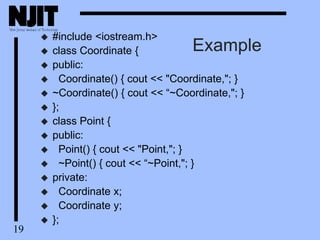


















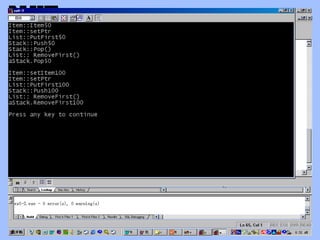



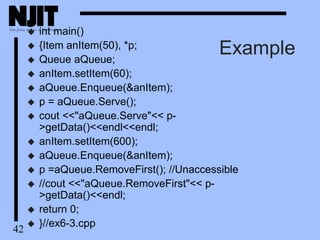











![54
Publication
class Publication
{
public:
Publication( char * publshr, Date & aDate )
: pubDate( aDate )
{
strcpy( publisher, publshr);
cout << "Publication constructorn";
}
~Publication()
{ cout << "Publication destructorn"; }
private:
char publisher[30];
Date pubDate;
};](https://image.slidesharecdn.com/inheritanceinc-231018122556-d9780813/85/Inheritance-in-C-ppt-54-320.jpg)











